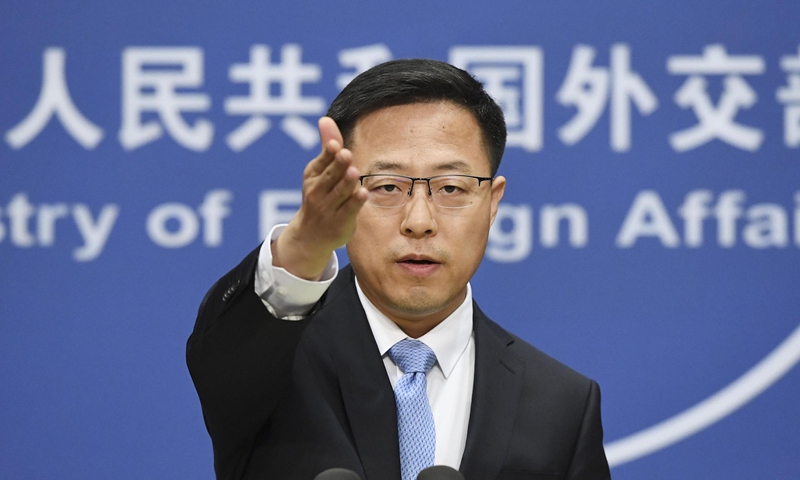High-level CPC delegation’s Nepal visit eyes issues of common interest, upholds noninterference principle: Chinese FM
By Yang Sheng and Zhang Hui Source: Global Times Published: 2020/12/28 18:08:39 Last Updated: 2020/12/28 22:45:42
Indian agents closely watch Nepali politicians' exchanges with China: expert

Zhao Lijian
Indian media outlets have paid close attention to the inter-party exchanges between the Communist Party of China (CPC) and the Communist Party of Nepal (CPN), which is the ruling party of the country. Some Indian media have been even speculating and criticizing this as a move by China to "interfere in the internal affairs" of other countries. Chinese experts say that the inter-party exchanges are not India's business, with India actually acting as the biggest external power interfering in Nepal's internal affairs.
According to the Chinese Foreign Ministry on Monday, the visit of a CPC delegation to Nepal was designed to conduct exchanges with Nepal on epidemic control, governance and other issues of common interest, and the CPC has always upheld the principles of noninterference.
Zhao Lijian, spokesperson of the Chinese Foreign Ministry, said at Monday's routine press conference, "The CPC has maintained close and friendly exchanges with major political parties in Nepal… This year marks the 65th anniversary of the establishment of diplomatic relations between China and Nepal."
"The recent visit of delegates from the International Liaison Department of the Central Committee of the CPC to Nepal was to conduct exchanges with Nepal on issues of common interest such as epidemic prevention and control, experiences on internal governance and China-Nepal cooperation for development, and to deepen exchanges and cooperation between the political parties of China and Nepal," Zhao said.
Lin Minwang, a professor with the Institute of International Studies at Fudan University, said that China has huge investment and deep cooperation with Nepal under the frame of the China-proposed Belt and Road Initiative, and as a neighbor, China has a legitimate reason to be concerned with the internal situation in Nepal and to provide assistance to its partners through inter-party cooperation and exchange, which is not "interfering in its internal affairs" at all.
Hu Zhiyong, a research fellow at the Institute of International Relations at the Shanghai Academy of Social Sciences, told the Global Times on Monday that the inter-party exchanges between the CPC and the CPN or other Nepali political parties are not India's business, and even if the CPC is providing assistance to mediate the CPN's intra-party conflicts, or sharing experiences on solving such problems, it was entirely reasonable and legitimate.
Zhao said at the Monday press conference that "China has taken notice of the political situation in Nepal. As a friend and neighbor of Nepal, we sincerely hope the relevant parties in Nepal consider national interests and the overall situation, to appropriately handle inner divergences, and to make efforts for political stability and national development."
The CPC is ready to work with all political parties in Nepal to push forward China-Nepal relations, Zhao said.
"In fact, whether in the past or at present, India has always been the biggest and most powerful external force interfering in Nepal's internal affairs," Lin further said.
Hu noted, "I have learned from Nepali scholars that India has sent intelligence agents to conduct surveillance missions on CPN politicians' exchanges with Chinese diplomats and visiting officials in Kathmandu [the capital of the country]. So who is interfering? The answer is clear."
Newspaper headline: China-Nepal inter-party cooperation 'not India's business'
Posted in: DIPLOMACY